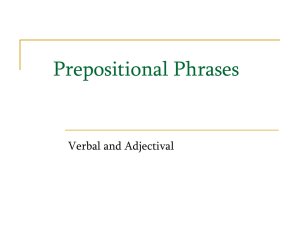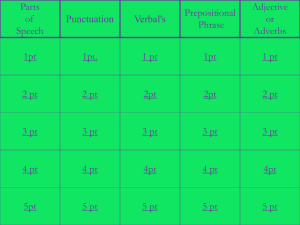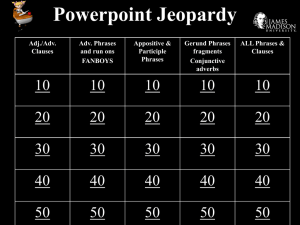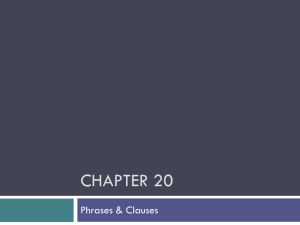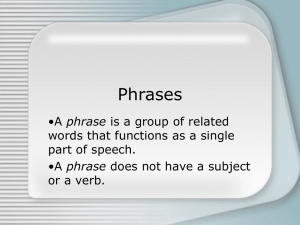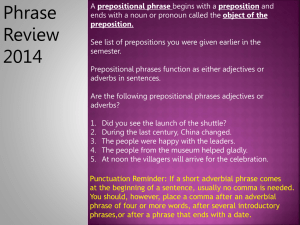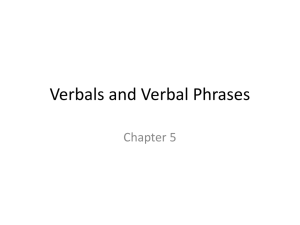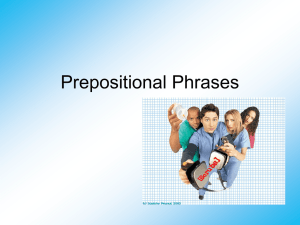Phrases - Mrs. Cottrill
advertisement
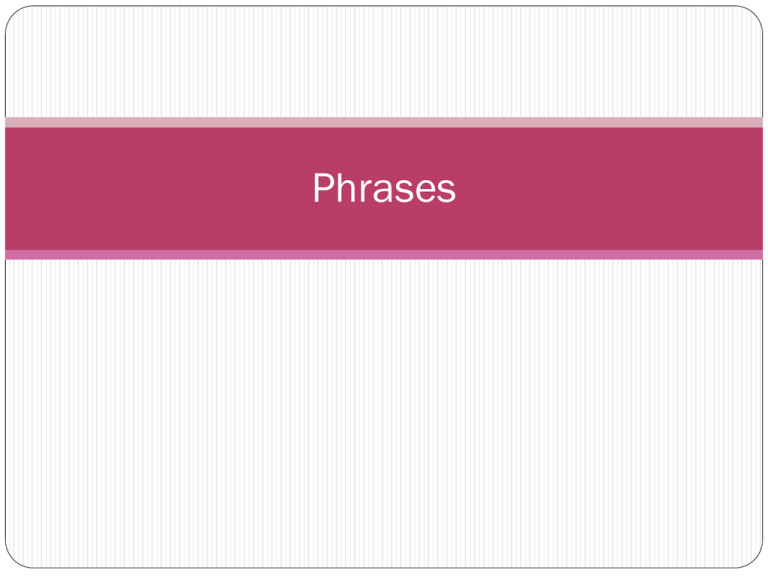
Phrases Phrases A group of words that act as a part of speech i.e. adverb, noun, adjective With the groom Singing Walking down the aisle To snow Phrases do NOT have a subject and a verb. There are three types of phrases: prepositional, verbal, and appositive. Prepositional Phrases A prepositional phrase consists of a preposition, its object, and any modifiers of the object. There are many kinds of sports. Some people take a sport to its extreme. Adverb Prepositional Phrases Like an adverb, an adverb prepositional phrase modifies a verb, an adjective, or another adverb. The cape buffalo is the most dangerous of all big game. (modifies the adjective “dangerous”) He said, in the same slow tone… (modifies the verb “said”) Adjective Prepositional Phrases Like an adjective, an adjective prepositional phrase modifies a noun or pronoun. “Here in the preserve on my island,” he said…(modifies the noun “preserve”) As in the example above, sometimes an adjective phrase modifies a noun or pronoun that is part of a different prepositional phrase. Placement of Prep. Phrases Take a look at these examples: Brockton Kennels sells retriever puppies to loving families with vaccinations. Brockton Kennels sells retriever puppies with vaccinations to loving families. Who has the vaccinations? The puppies or the families? Prepositional Phrase Practice 1. 2. 3. Underline each Prep. Phrase and circle the word modified. Identify each as adjective or adverb. Where would we be without creative geniuses? Many scientific discoveries are made by chance. Other inventions around the world have made life easier. Practice Answers 1. 2. 3. Without creative geniuses – would be – adverb By chance – are made – adverb Around the world – inventions - adjective Appositives and Appositive Phrases An appositive is a noun or pronoun that identifies or renames another noun or pronoun. An appositive phrase is made up of an appositive plus its modifiers. Gail Devers, a champion sprinter, was born in Seattle in 1966. Barcelona, a large city in Spain, hosted the Olympics in 1992. Essential Appositives An appositive that provides information that is needed to identify the preceding noun or pronoun. You DO NOT need commas with essential appositives. The American sprinter Gail Devers won an Olympic Gold Medal at Barcelona. Nonessential Appositives Add information to a noun or pronoun in a sentence in which the meaning is already clear. You MUST use commas! Devers, a survivor of Graves’ disease, overcame many obstacles to achieve athletic success. Appositives Practice Underline the appositive phrases in the sentences. Circle the appositive. Double underline the word or words the appositive renames or identifies. 1. Wilma Rudolph, another champion sprinter, also overcame a disability. Rudolph was born with the disease polio. Her mother, Blanche Rudolph, helped her recover. 2. 3. Verbals A verbal is a verb form that acts as a noun, an adjective, or an adverb. There are three types of verbals: participles, gerunds, and infinitives. Participial Phrases A participle is a verb form that acts as an adjective. It modifies a noun or a pronoun. A participial phrase consists of a participle plus its modifiers and complements. Played for more than 100 years, high school football has a rich tradition. (modifies the noun “football”) Large crowds attend games featuring rival schools. (modifies the noun “games”) There are two kinds of participles: Past (end in –ed) Present (end in –ing) Participial Practice Underline the participial phrases in the following sentences then circle the noun or pronoun that it modifies. 1. 2. 3. 4. 5. Increased demand for food is the result of the growth of the population. The popular comedian bowed to the laughing audience. The doctor examining me ordered a blood test. Tired after the long practice, the athlete stumbled. Andrea, leaping several feet into the air, caught the softball. Gerund Phrases, cont. A gerund is a verb form that ends in –ing and acts as a noun. A gerund phrase consists of a gerund plus its modifiers. He loves swimming. He loves swimming in the ocean. Like nouns, gerunds and gerund phrases can act as anything a noun can act as: Subject: Swimming competitively requires lots of practice. Object of a Preposition: Jeff got in shape by swimming at the YMCA. Indirect Object: Tameka gave competitive swimming a try. Direct Object: Mr. Lopez coaches high school swimming. Predicate Nominative: Tameka’s specialty is swimming the backstroke. Gerund Practice 1. 2. 3. 4. 5. Underline each gerund or gerund phrase. Then write how it is used: S, OP, DO, IO, or PN. Cheering the team gave me a sore throat. Joanna’s mother enjoys preserving fruits and vegetables. We stopped him from telling a secret. Playing chess takes a great deal of concentration. One of the most dangerous sports is skiing downhill. Infinitive Phrases An infinitive phrase is a verb form, usually beginning with the word “to,” that can act as a noun, an adjective, or an adverb. An infinitive phrase consists of an infinitive plus its modifiers and complements. More and more women are learning to golf. To make a living as a golfer is no easy task. Acting as a noun: To win tournaments is the goal of most top golfers. Acting as an adjective: In 1998, Se Ri Pak became the youngest player to win the U.S. women’s golf championship. Acting as an adverb: To become a champion golfer, Pak spent many hours practicing. Infinitive Phrase Practice 1. 2. 3. 4. 5. Underline the infinitive phrases in the following sentences. Then write how it is used: N, Adj., or Adv. To understand the difference between a democracy and a republic is important. The captain struggled to regain control of his foundering ship. The political prisoner refused to denounce his principles. Magellan’s ship was the first to circumnavigate the globe. The class approved the decision to offer tutoring services to younger children. Misplaced Phrase A phrase that is placed so far away from the word that it modifies that the meaning of the sentence is often unclear. Most commonly misplaced: prepositional and participial phrases The U.S. team in men’s indoor volleyball won the most Olympic gold medals in the 1980s. Dangling Phrases When the word (or words) that a phrase should modify is missing from the sentence. Most dangling phrases are participial or infinitive. Failing to win a gold medal in the 1980s, the Olympic women’s indoor volleyball competition has been disappointing.


